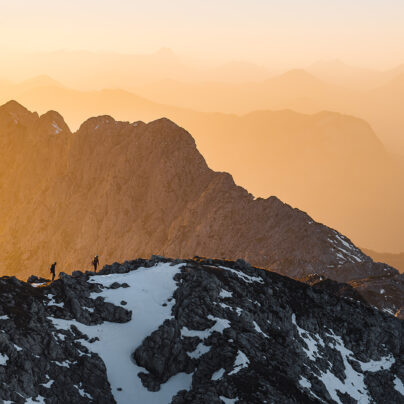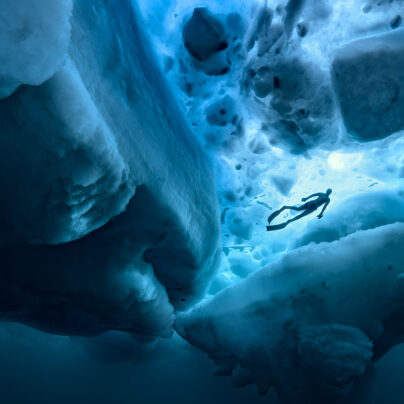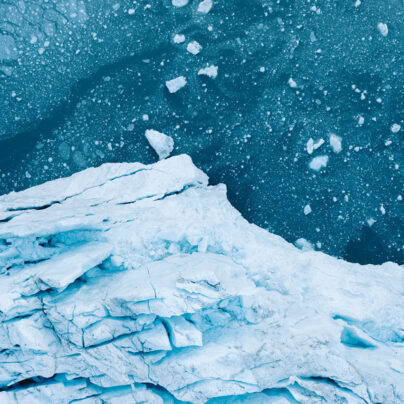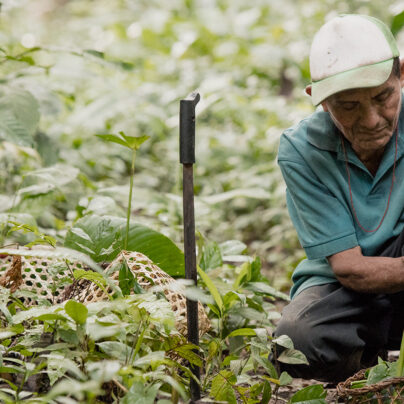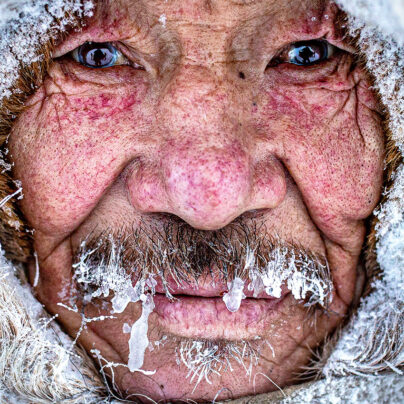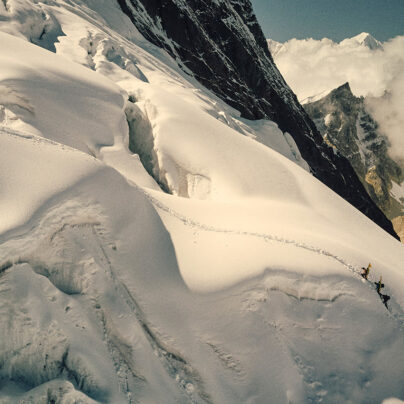Walking Mongolia To Hong Kong
Leon McCarron
I am here, at the end of it all, where landmass just runs out. Six months have delivered me to this spot. I’ve crossed deserts, summited snowy peaks, pushed my body to near breaking point and seen the inside of more police stations than is healthy. Three thousand miles across China, ten million footsteps and an amount of blisters that cannot be quantified. I never know what to expect at the end of a long journey, and now I recall why. There’s an overwhelming sense of calm, of relief. And always, a tinge of sadness. Behind me, the Hong Kong skyline begins to glow as night falls. For the second time in three years, I find myself finishing a journey, here, in the belly of the Pacific.
In 2010 I spent just over a year on a bicycle, setting off from New York City and arriving 14,000 miles later in Hong Kong. I was well and truly hooked; to life on the road, to adventure, to fitness and freewheeling and freedom. In Hong Kong at the end of that journey I rested up for a while with my friend Rob Lilwall. Rob too was no stranger to bicycles – in 2007 he flew to Siberia, and then spent the next three years cycling home to London via Papua New Guinea, Tibet and Afghanistan. He was now itching for a new adventure, and before I could hop on my plane back to London he’d pitched me a new idea – a walk from the Gobi desert to the South China Sea, through the heart of China. We would be fully self sufficient, and carry video cameras to shoot a TV show of the journey. Six months later, we boarded a plane to Mongolia…
It was mid-November when Rob and I arrived in the frontier town of Sainshand, with winter beginning to tighten it’s grip on the land. Dust kicked up by the wind obscured everything, but in fact there was little to see. South of here is home to the vast and empty expanse of the Gobi – the largest cold desert in the world outside of Antarctica.
We decided to pull a trailer loaded with all our supplies for the first two hundred miles to the Chinese border. Keeping our water from freezing was the big concern, and so we wrapped thirty large plastic bottles in locally bought fur-lined woman’s tights, put them in cardboard boxes and hoped for the best.
The fourteen-day crossing was punctuated by irregular snowstorms, causing the temperature to plummet to minus thirty. Those fur-lined women’s tights that insulated our water proved doubly useful when Rob hit upon the idea of wearing them ourselves at night in the tents. Very little can survive in a desert at this temperature, but there is a morbid beauty to the scene of endless tracts of rolling rocky wilderness and otherworldly sunsets. Throughout the long, cold days we strained our eyes constantly for telltales signs of the nomads – a goat here, a Bactrian camel there, a wisp of smoke escaping from a Ger on the horizon. Gers are the traditional nomadic homestead in Mongolia; the name in the local language means simply ‘home.’ Straight wooden struts form a circular shape, with fabric and sheep or goat’s wool packed around for warmth. Small and humble affairs, Gers provide dwelling for up to a third of the population of Mongolia. If we spotted one, we were inevitably invited in with a hospitality and warmth that blew us way. Herders with leathery faces shaped by a harsh life of extremes would cook us broths of fatty goat meat, and delight in letting us roll out our sleeping bags on the Ger floor. Unfortunately, with no common language we had to settle for gesticulating and the universal sounds of comedy to entertain each other – farting and burping.
We decided to pull a trailer loaded with all our supplies for the first two hundred miles to the Chinese border. Keeping our water from freezing was the big concern, and so we wrapped thirty large plastic bottles in locally bought fur-lined woman’s tights, put them in cardboard boxes and hoped for the best.


Edging along precipitous banksides, vertical drop below, I would have to remind myself that this is the life I chose. It may be cold, windy, dangerous – it might often be downright miserable. But this is a challenge; this is life out of the comfort zone, pushing myself to my limits and beyond.
Once we crossed the border into China, we dispensed with the trailer – resupplying would be much easier with at least one town per day now and so we packed all our essentials into backpacks. The pack weight fluctuated between twenty-five and thirty kilograms and a big worry was always injuries. A twisted ankle, a broken leg or even just a strain from the weight – any of these might have spelt failure for the expedition. We had been slowly building up the mileage, and were now averaging upwards of twenty-five a day, six days a week. It was punishing, but the human body is an incredible machine – the best and most reliable one there is.
We trekked west through Shanxi Province, traversing endless yellow peaks of the crumbly loess soil that makes the landscape so rugged. Those who live here make the most of the soft, flaky soil by cutting terraces for farming into the sides of the hills, creating a giant layered wedding-cake effect. Almost invisible to the naked eye, houses burrow deep into the mountains all around. The earthen shelters are so popular because they are cool in summer and warm in winter, and are home to over eight million Chinese.
Despite a severe lack of good maps, the cave-dwelling locals made sure we eventually found our way to the inimitable Great Wall of China. Stretching out to the horizon in both directions and punctuated by rectangular watchtowers, it glides over the hillside effortlessly, dominating and enhancing an already almost unbelievably picturesque scene. As you might expect from a structure built over five hundred years ago, the Wall here is in various states of disrepair. Standing on a tower, I imagined the fear that Chinese soldiers may have felt when they heard the thundering hooves of a Mongolian raiding party coming from the North to plunder. It is one of the great fallacies that the Wall is a continuous structure – there are actually numerous smaller sections stretching across the country, sometimes overlapping.
The trekking here was some of the most treacherous I have ever done. Edging along precipitous banksides, vertical drop below, I would have to remind myself that this is the life I chose. It may be cold, windy, dangerous – it might often be downright miserable. But this is a challenge; this is life out of the comfort zone, pushing myself to my limits and beyond. When I find myself in situations like this I know my appreciation for life increases exponentially– in fact, I’ve never felt more alive than when about to fall off a cliff in China.
Aside from tumbling down a remote mountainside, my other major concern before setting off had been the police. Our filming equipment was small by television production standards, but still much more than an average tourist would carry. The Chinese authorities are somewhat notorious for their strict control of the country, and I had heard horror stories of tourists being mistaken for spies. Apparently the bigger the camera, the bigger the risk…

As it turned out, we did get questioned by the police a handful of times. On occasion, we would get picked up seemingly every other day. That was the bad news. The good news was that despite initial distrust, all of the encounters ended pleasantly, often with the police insisting on buying us lunch or dinner to thank us for our time. The closest we came to disaster was when we inadvertently wandered into an unmarked military zone. Three officers picked us up on a remote road and drove us to the next town where we were interviewed, and our bags searched. Three hours passed, before the chief approached us and said firmly, “Don’t do it again”. “We’re not sure what we’ve done this time,” I said, “how will we know next time we’re in a closed zone?” “A policeman like me will arrest you. Don’t do it again,” he said, and led us to the door.
The penultimate month was in many ways the most enjoyable. The weather warmed to a pleasant degree, but had not yet reached the sweltering heat and humidity of the sub-tropics, which I would soon descend into. My Chinese was still poor but I could now communicate to a reasonable degree, and learn something of the people and places I passed through. My overwhelming sensation was that of a country developing at a rate of knots, so unstoppable that it’s future is thoroughly unpredictable. In the barren north I saw huge tracts of empty land marked out for new cities to be built. The cave dwellers would be moved in to improve the industry of the areas. Nearly every single town I walked through in six months was growing to some degree, most boasting cranes constructing skyscrapers on the outskirts. Families in the mountains and the countryside were noticeable by their lack of age diversity – all seemed extremely old or very young. Adults of working age had moved to the cities in search of work, becoming a part of the great migration from rural to urban, the past to the future. Grandparents are left in the country villages to bring up their grandkids while the parents work away for 11 months of the year.
I didn’t understand a lot of China – by the time I stumbled into the Hong Kong territory and dived headfirst and fully clothed once more into the Pacific, I was thoroughly overwhelmed and my head was spinning. It is unlike anywhere I have ever been, but I love it for that. The physical nature of the trek wore me out, but equally gave me moments of vitality that cannot be replicated in any other scenario. Incredibly Rob and I both finished with no serious injuries, showing just how resistant the body can be and how quickly it gets used to hardship and extremes. Hiking thirty miles a day is obviously not sustainable long term, but over six months I began to appreciate what I, and everyone else, is capable of. Already, having returned to a more conventional life in London I am dreaming of future adventures. At every opportunity I fashion an excuse to get out to the hills, back to the wilds…and I never regret a moment spent there.
My overwhelming sensation was that of a country developing at a rate of knots, so unstoppable that it’s future is thoroughly unpredictable. In the barren north I saw huge tracts of empty land marked out for new cities to be built. The cave dwellers would be moved in to improve the industry of the areas.

Leon McCarron is a Northern Irish adventurer and cameraman.
Previous to walking across China, he rode a bicycle 14,000 miles from New York to Hong Kong. He was an Olympic Torchbearer for the London 2012 Games, and his most recent expedition has seen him trek 1000 miles through the Empty Quarter desert in Oman, following in the footsteps of the British explorer Sir Wilfred Thesiger. The TV series about China, a short film about the desert trek and his first book about cycling are all due to be released this year.
Find out more about Leon via his website www.leonmccaron.com or follow him on
twitter @leonmccarron
